Copyright ©2008 PopEntertainment.com. All rights reserved.
Posted:
March 21, 2008.
Though she has lived a rather glamorous life – born in South
Africa, travelling regularly to Europe and the US, becoming a top actress in films like The Cider
House Rules, The Italian Job and In the Valley of Elah –
lately, Charlize
Theron has shown a fascination with the less glamorous side of the human
condition. That was dramatically shown in her Oscar-winning role as serial
killer Aileen Wuornos in the drama Monster – which was also Theron’s
debut as a film producer.
Just like on Monster, Theron has taken on
the dual role in
Sleepwalking. She toiled behind the scenes
to put the film together and get the money to get
it made. She also took on the supporting role
of Joleen – a conflicted woman whose life is a series of guys and legal
problems. When her latest lover is arrested for growing drugs, Joleen and
her daughter Tara are homeless again. They stay in the decrepit apartment of
her soft-spoken and shy brother James (Nick Stahl of Terminator 3 and
Sin City). Then, after a few days, Joleen just leaves without a word,
leaving her brother to raise her daughter – despite the fact that he had
neither the experience nor the money to care for an eleven-year-old girl.
For the vital role of the daughter, the filmmakers knew they had
found their perfect fit with AnnaSophia Robb. Though the young actress was
best known for lighter fare – stuff like Bridge to Terabithia,
Charlie and the Chocolate Factory and Because of Winn-Dixie –
Robb quickly proved that she could handle the deep emotional requirements of
the role.
A couple of days before Sleepwalking’s New York and Los
Angeles opening (and a little over a week before its wider national
release), Theron and Robb met with us at the Regency Hotel in New York to
discuss the movie.
We just got
finished talking to Nick, and he was telling us that the
temperature at some of the sets were
50 below, which makes me think there must have been a lot of love for this
project. What attracted you to this material?
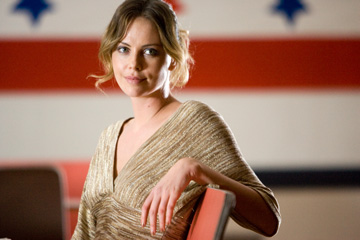 Charlize
Theron:
You know,
it’s really hard. I like to read a lot of material. A lot of stuff gets
submitted through the company. I really just enjoy the process of reading
through material. I think a lot of my decision-making process comes from –
it just either emotionally happens or it doesn’t. I’ve many times had
scripts sent to me where people [who] I really respect their opinions say,
“It’s an amazing piece.” You read it and it is an amazing piece – but
there is no chemistry there. This [screenplay] stayed with me. I
liked it. It felt like real people. It didn’t feel like a watered-down
version of a dysfunctional family. I thought it was ballsy. I thought it had
great wit. I thought it was incredibly real, but incredibly hopeful at the
same time. That hope is something that I am very attracted to. It’s the one
thing that we all have in common, no matter where we come from [or] what our
circumstances are. We all have hope.
Charlize
Theron:
You know,
it’s really hard. I like to read a lot of material. A lot of stuff gets
submitted through the company. I really just enjoy the process of reading
through material. I think a lot of my decision-making process comes from –
it just either emotionally happens or it doesn’t. I’ve many times had
scripts sent to me where people [who] I really respect their opinions say,
“It’s an amazing piece.” You read it and it is an amazing piece – but
there is no chemistry there. This [screenplay] stayed with me. I
liked it. It felt like real people. It didn’t feel like a watered-down
version of a dysfunctional family. I thought it was ballsy. I thought it had
great wit. I thought it was incredibly real, but incredibly hopeful at the
same time. That hope is something that I am very attracted to. It’s the one
thing that we all have in common, no matter where we come from [or] what our
circumstances are. We all have hope.
Do you look
at scripts now both as an actress and a producer? Do you look at them from
two different perspectives? This script, you may love it as an actress, but
as a producer do you think, “How will we ever sell this?”
Charlize
Theron:
It’s
interesting, the producing aspect. I don’t really compartmentalize the two.
You don’t read something and go, “I love this. I’m going to produce this.”
(laughs) It’s a much longer process than saying yes to an acting role
and then two months later you’re on set doing it. Somebody has already done
all that work. We have a lot of material. Development is really just a fancy
word for basically just saying we’re praying and hoping. You have a lot of
stuff that goes through that development process. This industry is really
changing nonstop as far as financing aspects of independent filmmaking.
You’re always meeting with new financing entities. You’re always let them
know what you have. They look at it. If they’re interested they might step
in and you get lucky. Then for me, another element of that is really the
cast. I don’t want to just go make something. I want to work with people
that I really want to work with. I love this, but it took us a
year-and-a-half to two years to get a financier to jump on board and step up
with the money that we needed. Then Nick [Stahl] came on, which was great,
but I knew this story was going to work with the dynamic of Tara and [James,
the character played by] Nick. No matter how great Nick was going to be, we
needed to get a young girl that could emotionally carry the same amount of
weight. That’s tricky. It is heavy material for a child. You can’t pretend
your way through it. So when AnnaSophia came in and played with us for day,
that’s when I fully committed to it. I knew we had the money and the talent
to pull it off.
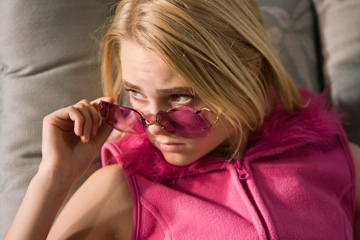 AnnaSophia,
would you say this was your most adult role? You’ve mostly done kids’ films
before…
AnnaSophia,
would you say this was your most adult role? You’ve mostly done kids’ films
before…
AnnaSophia
Robb:
Yeah. It’s my first adult film. Thankfully, this is my first real strong
adult film and Charlize was there to help me, support me and talk to me and…
Charlize
Theron:
Beat you up.
AnnaSophia
Robb:
Yeah beat me
up. (smiles) Just curse me out. (They both laugh) She
was just there for me every day. She made a very comfortable environment, so
I felt safe. I felt open to try anything and everything. We wanted to make a
good movie. I wanted her to push me. I’m thankful for that, because it made
me not scared to do heavy material. To be able to get down into those dark
places but then come back up. Everytime there was a scene like that, she was
there for me. I think I’m going to be a healthier actor because of this.
What’s
the most important thing you’ve learned when you’ve done a movie as both an
actress and producer?
Charlize
Theron:
The first time we produced was on Monster and that was a really
incredible experience, so it set the bar really, really high. But the one
thing I walked away from in that experience that I really wanted again was
this incredible partnership with everybody in making a film. That kind of
collaboration where you don’t feel like you’re shooting a film, you’re
basically just documenting. That was how Monster felt, and that was
how this felt. That’s what makes it not compartmentalized for me. It’s not
like this-this-this-this and then oh my God, now I’m in front of the
camera. It’s a creative process. All we’re doing all day long is discussing
and debating: who these people are, what the world is, how to make it
authentic. You’re just constantly in that, so that when you put the wardrobe
on and you walk up on the camera, you can roll and shoot. Then, when we’re
done, we’re done. I took that from Monster. That’s how I really enjoy
making films. I hope to continue doing that.
Do you
have any recent films which inspired you?
Charlize
Theron:
There were a
lot of great films this year. I really loved Julian Schnabel’s film (The
Diving Bell and the Butterfly). I really loved the Coen Brothers film
(No Country for Old Men). I loved There Will Be Blood. I thought
the Marion Cotillard was just absolutely brilliant (in La Vie en Rose)
and I really loved the film as well. I was just – wooh! Loved that,
loved that. I walked out of the theater and was like: Yeah, let’s go to
work! I was really, really happy for her. There were a lot of great
films. I really loved Sean Penn’s film, too – Into the Wild. That,
wooh… amazing – really amazing.
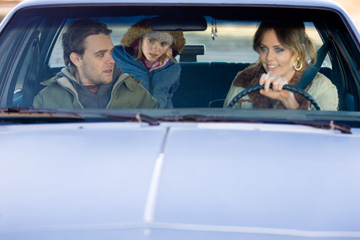 Do you
have an affinity for characters with tough and grim backgrounds? You come
from a very different place.
Do you
have an affinity for characters with tough and grim backgrounds? You come
from a very different place.
Charlize
Theron:
I think what you’re referring to are Monster and North Country
and this. All those characters come from the same economical stature. The
one thing that I learned – and maybe that I have in common – is when you
come from a harsh landscape you become incredibly resilient. I think that
makes you feel they’re kind of in the same world there. But I’ve been doing
this for fourteen years and I’ve made close to thirty films. If I’m going to
have to start saying no to good stories just because there is some
correlation there somewhere, I’m not going to be working as an actor very
soon. (laughs) The understanding comes from – I have a real obsession
with human behavior. I love reading about it. I love observing it. I like
asking questions about it. I’m fascinated by how we function as human
beings. I think all actors secretly have that. It’s interesting for us to go
and try and find the empathy within that adversity – to try and find the
authenticity of that person, or the flaws, the beauty and the hope. It’s a
great gift, if you’re into that thing.
There’s
that scene when you’re driving away from the house where your boyfriend is
busted and you roll down the window and flip the police off. It really
seemed faithful to the character. Was that in the script, or did you just do
it?
Charlize
Theron:
It was in the
script. But I was supposed to originally be mad and I was like: no, I can’t
see that. It’s a moment of glory – her flip off to authority. But I also
thought it was important to show that this was a woman who was quite
reckless. She didn’t really understand any sense of responsibility. There
were all these little signs that we had to get across in the first fifteen
minutes of the film – that showed somebody very conflicted and making a
really horrible decision [to leave her child]. In our
society [it] is very unforgiving and should be. At the same time, [we were]
just showing the openings. The moment where she says, “How old do I look?”
You see a woman who’s very insecure and feels like the only thing she really
has to give is what she has physically. She doesn’t really think a lot about
herself. Where she says to the guy: “Tell me you love me – even if it
doesn’t mean anything.” You find all these little moments that give you some
kind of an idea that something’s not quite right. At the same time, it all
comes down to empathy.
AnnaSophia, you had some scary scenes with Dennis Hopper. What was your
impression of him? How terrifying was the slap?
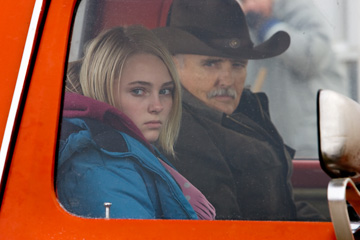 AnnaSophia
Robb:
When I first
met Dennis, well first of all, he gave Charlize a big hug. Then I was like,
oh, well, he’s all good. (laughs) He has such a presence and he is
such a kind man. He has so much to offer as an actor. We had a read through
and I just saw this man as a mean, nasty old man who had been abused before
and that’s why he acted like this. I found so much more to that, just
talking about why he did this thing this way and thinking about where his
wife had gone – all these different questions brought up that I had never
thought about. I was just so in awe of him. How he was excited about the
work he was doing and really thinking about his character. It wasn’t like he
was just coming on to be on the shoot for eight minutes. He was really
investing in the character.
AnnaSophia
Robb:
When I first
met Dennis, well first of all, he gave Charlize a big hug. Then I was like,
oh, well, he’s all good. (laughs) He has such a presence and he is
such a kind man. He has so much to offer as an actor. We had a read through
and I just saw this man as a mean, nasty old man who had been abused before
and that’s why he acted like this. I found so much more to that, just
talking about why he did this thing this way and thinking about where his
wife had gone – all these different questions brought up that I had never
thought about. I was just so in awe of him. How he was excited about the
work he was doing and really thinking about his character. It wasn’t like he
was just coming on to be on the shoot for eight minutes. He was really
investing in the character.
Charlize
Theron:
You know we
actually paid him a lot of money.
(Both laugh)
AnnaSophia
Robb:
Okay, well that makes sense now. After every take, no matter if it was a
really dark one or it was tense but not extremely emotional, he would always
say: “That was a good take,” or “Are you all right?”
Charlize
Theron:
He didn’t
physically hit her, really. Tell about the little trick he taught you.
AnnaSophia
Robb:
He had a
glove and he’d take it off and he’d just use the fabric.
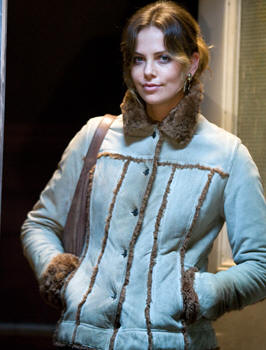 As a
producer, what went into deciding that he should get the role?
As a
producer, what went into deciding that he should get the role?
Charlize
Theron:
I feel incredibly blessed because when I read, I do imagine faces and actors
who would be really brilliant in certain roles. I’ll never forget the first
time I read it. The opening scene with the dinner was written beautifully.
There was an incredible amount of charisma that this guy needed to have.
When I think of that kind of really conflicted [person] – you just don’t
know what you’re going to get, so charming that you want to hug them but
you’re kind of scared – Dennis Hopper just comes to mind. He’s so good at
doing that. I got the dream cast I really hoped for. As a producer, it’s
always a little bit tricky, because you want to work with the people you
really feel are right for the role. Who are going to inspire you – who I
want to surround myself with and work with. At the same time financiers want
to have some kind of guarantee. What is considered a guarantee in our
business today – there’s this idea that some actors are more bankable or
more of a box-office draw than others. It’s a very tricky thing as a
producer to find that medium where you can get the right guy for the right
draw – instead of just getting somebody because they’re kind of hot at the
moment. It’s just too much work for me not to do it with the people I
really, truly believe are right for the role – that I want to make it with.
Anna Sophia,
what’s one thing you learned from working with Charlize?
Charlize
Theron:
(mouths silently)
Nothing. Nothing.
AnnaSophia
Robb:
(laughs) Yeah, really nothing. I would say just having…
Charlize
Theron:
(teasing, threateningly) Watch it…
AnnaSophia
Robb:
The passion
for all the projects that we’re doing. Just loving what you are doing.
CLICK HERE TO READ WHAT ANNASOPHIA
ROBB HAD TO SAY TO US IN 2013!
Email
us Let us
know what you
think.
Features
Return to the features page.